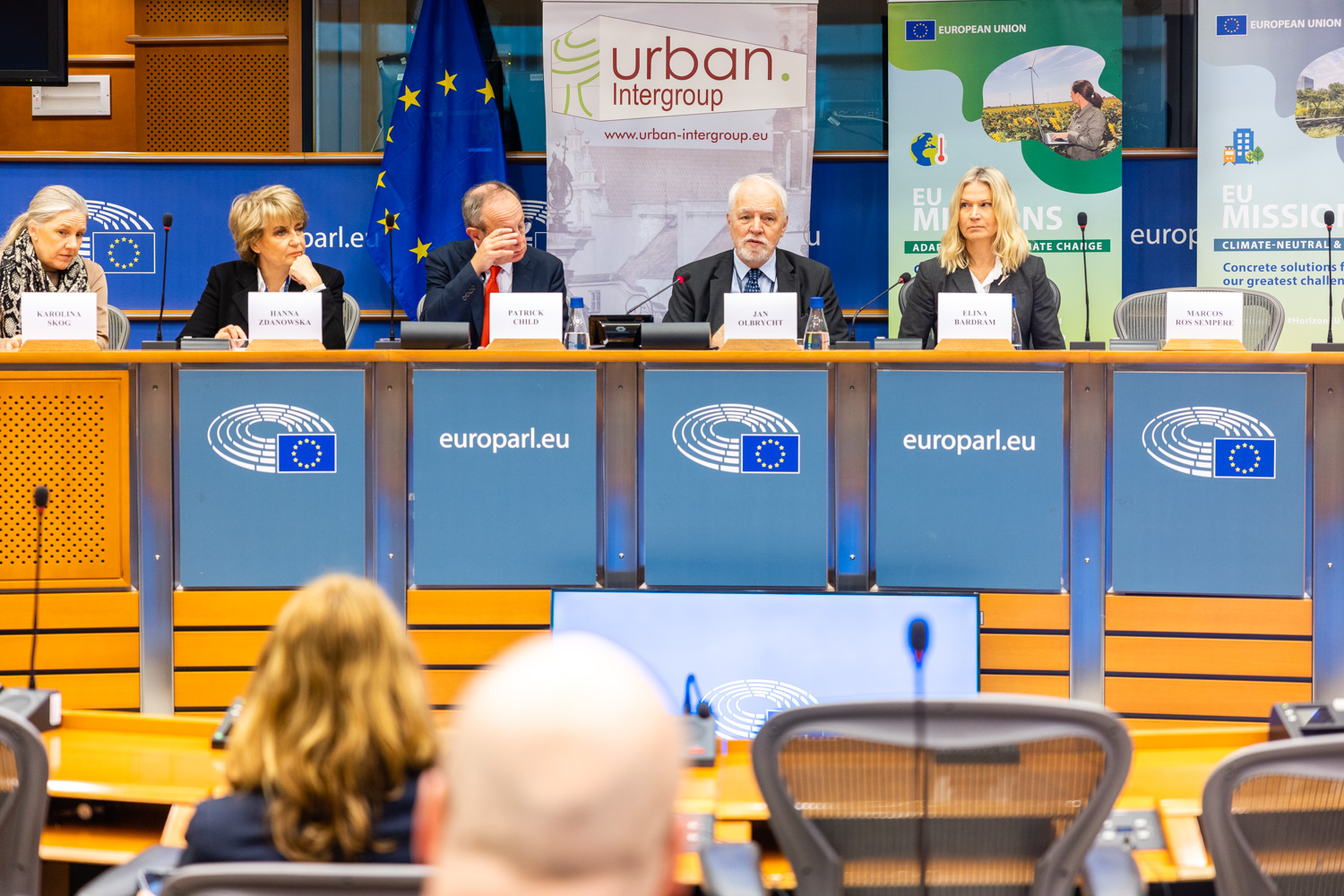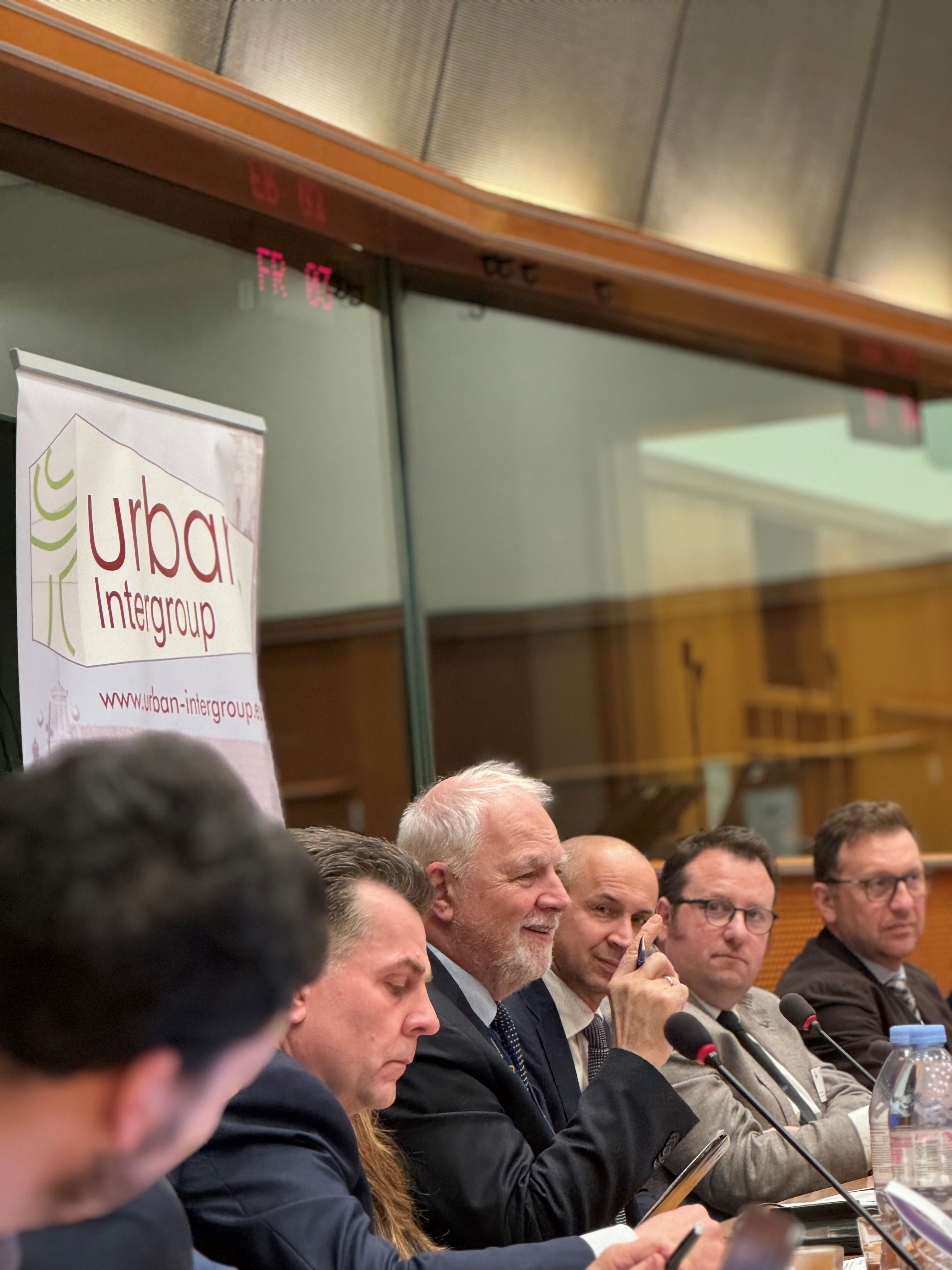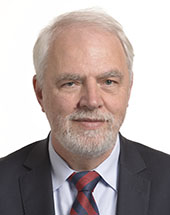Cities and regions as forerunners in climate action
 The Tuesday morning conference, hosted by the Urban Intergroup, focused on how cities and regions are, or should be, taking the lead in the climate action arena. Moderated by MEP Jan Olbrycht, the event delved into the specifics of the EU’s climate mission and explained why it is a game-changer for cities. Attendees discussed the details of EU institutions collaborating with local governments, shared their viewpoints, and proposed numerous potential improvements for this type of EU mission.
The Tuesday morning conference, hosted by the Urban Intergroup, focused on how cities and regions are, or should be, taking the lead in the climate action arena. Moderated by MEP Jan Olbrycht, the event delved into the specifics of the EU’s climate mission and explained why it is a game-changer for cities. Attendees discussed the details of EU institutions collaborating with local governments, shared their viewpoints, and proposed numerous potential improvements for this type of EU mission.
MEP Jan Olbrycht raised fundamental questions about the Horizon Europe project. Why is this mission such a significant endeavor for the European Union? Why is it essential for cities to unite to achieve mission targets? How can different levels of government collaborate, and is the EU providing adequate assistance? Is the mission merely a trial run or a genuine effort to combat climate change? Are the allocated funds being effectively utilized?
Patrick Child, Mission Manager, Deputy Director-General of DG ENV, defended the EU missions, emphasizing them as the real solution for combating climate change. Mr. Child stressed that this EU project has firm deadlines, which must be respected, serving as evidence that it is not an experimental mission, as suggested by some. He portrayed the mission not as an experiment but as a tool, that needs refinement. Furthermore, he insisted on the importance of engagement at the local level and the significance of dialogue with local representatives. “That is when policy meets the people,” Mr. Child remarked.
Another significant point on the agenda was the “climate city contracts”: these contracts aim to scrutinize cities’ climate plans and inquire how they intend to achieve their goals. Ten cities have already completed these climate city contracts and, as a result, have received a mission label (Mr. Child likened the label to a “vote of confidence” from the EU).
He highlighted the substantial mobilization of cities in this mission but emphasized the need for greater support from national governments, citing several examples to illustrate this mobilization.
Elina Bardram, Mission Manager and Director in DG CLIMA, continued the discussion by emphasizing the importance of resilience at the local and regional levels. “Different forces are pulling the agendas in different directions,” Ms. Bardram remarked to illustrate that local agendas do not always align with national administration.
She further underline the technical aspects of the mission, stating, “The climate mission is not a fleeting initiative; it requires planning and anticipation. First, necessary structures and platforms must be established before expecting results.”
Ms. Bardram echoed Mr. Child’s sentiment that cooperation with citizens is crucial for the success of this mission. According to Ms. Bardram, these projects serve as vehicles for multilevel governance horizontally and vertically.
Nicola de Michelis, acting Deputy Director-General of DG REGIO, addressed Mr. Olbrycht’s question regarding the coherence between different instruments. “We have identified numerous tools dealing with urban matters; there is an issue with consolidating all the initiatives at the European level concerning urban matters,” Mr. De Michelis explained.
He elaborated on efforts to connect these initiatives and presented several examples of programs facilitating multilevel cooperation. Designing policies requires involvement from all levels of governance, he stressed.
Our guest also noted that Brussels often feels distant from local levels. According to him, the ultimate responsibility lies at the city level, prompting governors to allocate funds for constructing sustainable urban development strategies.
Hanna Zdanowska, Mayor of the City of Lodz and Committee of Regions member, began her speech by noting that five cities in Poland are part of the city mission: Lodz, Rzeszow, Wroclaw, Warsaw, and Krakow. According to Ms. Zdanowska, these cities have significant potential for development, and the EU is aiding them in enhancing their capacities and accessing funds. Thanks to the EU mission, cooperation can be more efficient. Like the other guests, she emphasized the importance of citizen participation, stating, “We must act.”
The Climate mission facilitates real progress: cities become more efficient, implement better solutions, collaborate with other cities, gain better access to EU policies, and engage with policymakers. However, Ms. Zdanowska insisted that more effort is needed: cities require better recognition by the EU in terms of their financial needs.
MEP Marcos Ros Sempere, member of the Committee on Regional Development, began by highlighting the crucial role cities will play in the upcoming term. He praised initiatives like the European Bauhaus and explained the link between the project, which he fully supports, and the mission. He further underscored the importance of cooperation between climate and budgetary concerns, stating, “We must link the 8% of the budget dedicated to cities with the climate goal because we feel that we are investing a lot of money in old solutions that are not climate responsible.” Finally, to gauge the results of the mission, Marcos Ros Sempere stressed the incorporation of climate indicators in cities.
MEP Christian Ehler, a member of the Committee on Industry, Research, and Energy in the European Parliament, approached the subject from a technical standpoint, explaining the complexities of managing the mission tool. He also mentioned the strong skepticism from the Council and the Commission regarding the mission instruments due to insufficient budgetary allocation; according to Mr. Ehler, €300 million is insufficient.
MEP Lina Galvez, Vice-chair of the Committee on Industry, Research, and Energy in the European Parliament, presented a more critical perspective on the EU climate mission. She explained that she was the first to organize activities for the cities’ mission in Andalusia since 2019, involving universities, governments, and other stakeholders. However, she noted a significant change in the mission since 2019, observing considerable heterogeneity that does not work uniformly everywhere.
According to Ms. Galvez, the mission should be more comprehensive. She concluded by stating that while the mission holds significant potential, there is a need to rethink its utilization to achieve climate neutrality effectively.
Karolina Skog, Climate-Neutral and Smart Cities Mission Board Member, had the final word at the event, concluding with her opinion on the subject: According to her, the mission and its instruments are the right tools to achieve the EU’s goals. She emphasized the necessity for regulations to be developed in collaboration with local governments, considering the myriad of regulatory challenges faced by cities.
Hailing from Sweden, Ms. Skog cited her country as a successful example of the EU mission’s efficacy: “In Sweden, the mission works,” she affirmed. Ms. Skog final point pertained to the collaboration between the climate and financial departments, which she deemed as the first tangible cooperation between these two sectors.
Drones over the cities. How to seize the opportunity?

On 23rd of January 2024, the Urban Intergroup, under a leadership of Jan Olbrycht MEP, organized a conference on “Drones over the cities. How to seize the opportunity?” The event organized as a way to create a dialog between representatives of local authorities and European Institutions regarding the drone usage in urban communities. The speakers emphasized the importance of approaching the subject with caution because of many risks connect to use of UAVs but also highlighted many opportunities that this emerging market can provide for all Europeans.
The conference began with opening remarks from Jan Olbrycht MEP who welcomed distinguished guests and proceeded to give everyone a brief overview of the URBAN Intergroup character, tasks, focuses and organisation. Mr. Olbrycht spoke about the emergence of drones in connection with Russian aggression in Ukraine, and how they are now in consciousness of many nowadays. “The question is whether we know how to use them. This is a very interesting tool. It can be used to spy on or attack someone, but are we ready to use it for something positive, like city management.” he said. Mr. Olbrycht also raised questions about a possibility of using drones as control and monitoring tools, which can be both at the same time very beneficial for city management and potentially create a risk of breach of privacy rights of citizens.
Kazimierz Karolczak – chairman of a board of the GZM Metropolis, spoke about drones from the perspective of managing of a very big urban community. Before addressing the main topic, Mr. Karolczak spoke briefly about the GZM goals, as a biggest metropolis in Poland. He emphasized that the Silesia is an example of market growth of drones and a perfect region to learn and study from. He urged the lawmakers to create a legal framework for deploying UAVs in cities as a management tool, to embrace the technology developed in recent years. “The key point is that we as Europeans, as Poles are wait for rules to size those opportunities, to operate drones in cities and to really start this market”
Vasilys Aguridas, leader of Urban-Air-Mobility Initiative Cities Community and UAM CIVITAS Initiative spoke on urban air mobility as a system of utilising drones in an urban environment. Mr. Aguridas emphasised that the definition of what is urban air mobility is very much dependant on the local characteristics and it would be inadequate to use one formula for all regions. There are very real safety dangers potentially connected with usage of drones in cities and Mr. Aguridas stated that convincing the local communities about the safety of those systems must be a priority. There is also a need for working with local politicians to create much needed political capital for the implementation of “urban aviation”, which is one of the goals of Initiative lead by Mr. Aguridas. “It is more about a socio-political ecosystem. It is not about what the technology can do for us but what we want technology to do for us.” he concluded.
Justyna Siekierczak, Member of the Board of the Polish Chamber of Unmanned Systems, underlined the chamber role as a supporter of the effort of the cities with their tasks connected to drones. Ms. Siekerczak spoke about the problems regarding the UAV market including regulatory difficulties and criticised some of the decision made by European Aviation Safety Administration (EASA). “Drones are an essential part of the digital transformation of the European Union and we should ask how to size this opportunity? We should use mature implementation but above all create regulation that simplify drone implementation.” Ms. Siekierczak pointed out instances of overregulation of some categories of drones, which makes it very difficult for local authorities to use them effectively.
Ivo Cré – Director of Policy and Projects – POLIS, who spoke about the needs of local authorities to implement drones as a tool for urban management. Mr. Cré underlined a problem of lack of professionals, who are educated in a field of drones – “Cities want to employ people who actually know about those topics. The industry will benefit from the fact that the local authorities can be sure that the people who they talk to are competent. So we need an EU level certification of people, so it is clear who knows and who can talk about this field.” There is also a need in the eyes of Mr. Cré, of involving representatives of the cities in the decision making process when the next rules for the drones will be created.
Magda Kopczyńska, Director-General in DG Move in the European Commission, endorsed many of the points raised by previous speakers. Ms. Kopczyńska said the EU needs to be conservative when it comes to drone safety, but very aggressive when it comes to supporting European drone manufacturers. According to Commission estimates, by mid-2022, more than 1 million drone operators had been registered and more than 650,000 certificates had been issued in the 27 member states, so it is a very fast growing sector. Ms. Kopczyńska emphasised that EASA and the Commission must act in such a way to create a good environment for companies in this market to prosper, especially for small and medium enterprises in this market. “As always with any innovative sector, as always with any new emerging technology. There is this important balance to strike between creating a level playing field that is safe without hindering, and blocking the most innovative actors in the area. This is the dilemma that concerns the Commission.” Ms. Kopczyńska said while promoting a risk-based approach to the issue.
Luc Tytgat – Acting Executive Director of European Union Aviation Safety Agency (EASA), started by addressing the concerns raised about the EASA actions by the previous speakers. He underlined the Agency’s commitment to create a looking forward but at the same time a safe approach to the issues facing drones implementation in the urban environment. Mr. Tytgat also emphasized the EASA commitment to make Europe the safest continent for aviation, but at the same time the openness to work together with local governments when implementing the rules. Mr. Tytgat also promoted the use of IT tool called Innovative Air Mobility Hub, which was created to for both industry actors and local representatives to help them use drones under current legal framework.
Ciarán Cuffe MEP, member of Committee on Transport and Tourism, from Ireland, started his speech by compering situation of micro mobility 5 years ago with situation of drones nowadays – “Prospect of free floating bicycles and scooter was seen as something that maybe will completely transform our cities perhaps for the better. I think 5/10 years in, yes, there are use cases for those micro mobility devices but they are not completely transforming our cities. I think that in the same way the introduction of drones may not be as much of a game changer as perhaps some will suggest.” Mr. Cuffe explained that in his opinion the best case for use of drones is not in the cities but in the most remote areas and caution should be advised about visions that drones as a quick fix for transport problems of urban areas and saviour for us all. “We all are brought together by a vision of cities that are cleaner, quieter, greener and the jury is still out as to whether drones can deliver that.”
Władysław Ortyl, representative of Committee of the Regions and President of the Podkarpackie Region in Poland, focused on the perspective of local governments on the issue of drones. Mr. Ortyl said that after many talks with various local representative it is clear to him that the drones are very much an issue that should and will be solved on the local level. “The rise of the drone market is immense, but we need to talk into account the The European Green new deal, changes in public opinion after the Russian aggression in Ukraine but also need to support the private sector and safety of citizens.” Mr. Ortyl call for not only passing legislation regarding drones regulation but at the same time, building a structure that would help to implement those rules by local communities.
Presentations showed during event:
Polish Chamber of Unmanned Systems
Urban-Air-Mobility Initiative Cities Community



